Flying insects can ruin a barbecue fast. I can’t tell you how many times I have given up, packed up my food and went inside, letting the bugs win. The worst part about it is there is really no need to let the bugs win. We have the technology. We can beat them.

Whether you prefer a modern bug zapper, a homeopathic repellent or planters filled with lavender and lemongrass, there are many ways to keep those bugs at bay.
In Part 1 I’ll provide info on the use of plants and plant based products as flying insect repellents. Look for Part 2 to cover the application of modern technology to repel those unwanted dinner guest.
The Natural Way
Throughout time people have used plants to improve and sustain life. From brewing bark into teas to burning leaves to ward off evil. Plants provide us with the remedy to many things. One happens to be those pesky insects. There is a natural method to repel every type of insect you can think of. Sometimes plants must be crushed up to release their natural oils and other times the whole plant does the trick.
| Plant | Whole Plant | Oil Only |
| Citronella | ? | X |
| Lavender | X | |
| Lemon Eucalyptus | X | |
| Peppermint | X | |
| Cloves | X | |
| Lemongrass | ? | X |
| Catnip | X | |
| Cedarwood | X | |
| Basil | X | |
| Neem | X | |
| Sage and Rosemary | X | |
| Lemon Thyme | X | |
| Tea Tree | X | |
| Cinnamon | X | |
| Marigold | ? | x |
- Citronella: This is the first plant most people think of when asked about mosquito repelling plants. It is a member of the geranium family, and the plant carries the fragrance of citrus in its foliage. When the leaves are crushed and the oil rubbed on the skin, it has a lovely smell and is thought to naturally discourage mosquitoes. The plant itself does not act as a deterrent to mosquitoes. Citronella based products are only effective for about two hours because the oil rapidly evaporates. Most citronella candles only have about a 5% concentration of citronella or less. The U.S. Center for Disease Control does not list citronella on it’s list of recommended mosquito repellents. The bottom line is, it smells nice and looks pretty but it’s not really the best choice to keep the mosquitoes away.
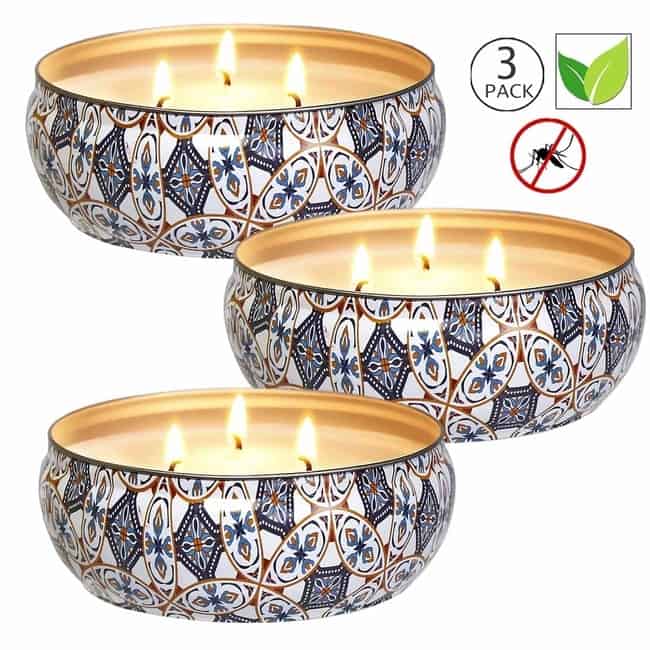
The most popular forms of citronella sold in the U.S. and Canada are candles and oil. Click here to see current pricing. As an Amazon Associate, I earn from qualifying purchases.
Image vautolab.com
Citronella oil is made into sprays, lotions, pellets, candles, pouches, wristbands, and flea collars. You can purchase citronella products, including the plants, in garden stores and at online retailers. Even the local grocery store and dollar store will usually have several citronella products available in the summer months.
- Lavender: repels moths, fleas, flies and mosquitoes. A 2009 study in the Journal of Vector Ecology found that lavender oil possessed a 93% repellent rate against mosquitoes indoors and only around a 53% repellent rate against mosquitoes outdoors. When planted in the garden the stunning purple flowers can be used to promote calmness and wellness. reduce stress, anxiety, and possibly even mild pain.
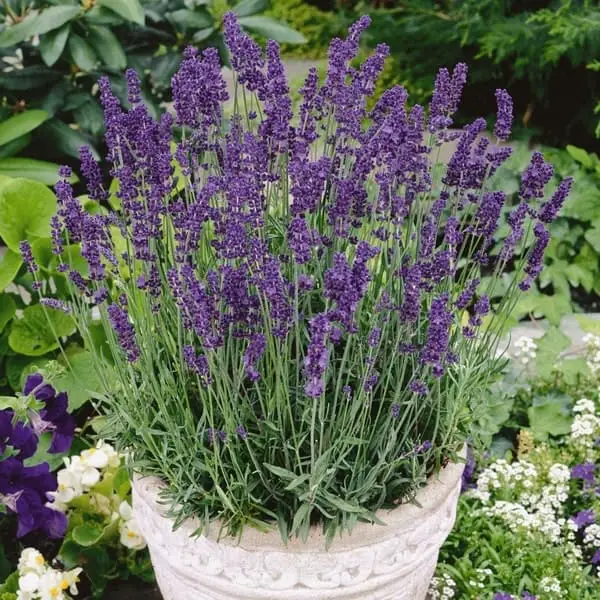
Image Wideopeneats,com
It’s easy to make a lavender oil from the plants you grow. First you boil 1.5 cups of olive oil. Then add 2 cups of lavender plants buds and stems to the oil and let simmer for 30 minutes. Cool the liquid and strain twice. Once through a colander and once with a coffee press if you have one or a very fine strainer if you don’t. Lastly, Refrigerate the mixture in an airtight container until it becomes cloudy.
- Lemon eucalyptus: According to Health.com lemon eucalyptus is the only natural mosquito repellent that works. The CDC does list it on their approved mosquito repellent list and they state, “When used as directed, EPA-registered insect repellents are proven safe and effective, even for pregnant and breastfeeding women.” Conversely, the US Environmental Protection Agency does not certify lemon eucalyptus oil’s efficiency as an insect repellent. But they seem to be among the minority. The lemon eucalyptus tree grows only in Australia. There are also beautiful lemon eucalyptus plants but they are not useful on their own.

Cutter Lemon Eucalyptus spray is one of the more popular ones on the market. It’s DEET free, smells fantastic and truly works. Click here to check price.
Image cutterinsectrepellents.com
- Peppermint: Peppermint is a beautiful green leafed plant. The leaves are often covered in tiny hairs and have a serrated margin. It has a wonderful minty smell and taste. You can pick the leaves right off the plant for a delicious addition to food and beverages. Most bugs despise the smell and taste of peppermint, so planting it around your home is a great way to keep them away. If you do happen to get bitten, peppermint leaves rubbed directly onto the skin make a great bite relief treatment. A 2011 study showed that peppermint essential oil provided 100% protection against bites from adult yellow fever mosquitoes for up to 150 minutes. Peppermint is also effective on flies, fleas, ants, and mice.
- Cloves: are also known to have insect repelling properties, particularly against flies and mosquitoes. Fly’s hate both lemons and cloves so when combined and placed on the table while dining outside they make a pretty good natural repellent. This combo works best on the common house fly.
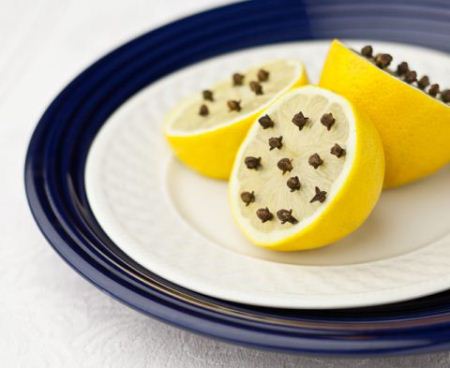
Image Flysonly.com
If you want to make a fly repellent clove oil to put on your skin, you can dilute the clove oil with olive oil, rubbing alcohol or witch hazel using 1 part of clove oil and 10 parts of of your chosen diluent. Clove oil should never be applied directly on the skin as it can cause burning sensations, skin irritations and nerve damage.
Fun Fact: The expression “you can catch more flies with sugar than you can with vinegar” is a well known adage. But it’s only half true. Fruit flies are attracted to rotting or decaying fruit. A cup of vinegar covered with plastic wrap and with a hole poked in it, is very effective in combating a fruit fly invasion.
- Lemongrass: is often one of the best options for beginner gardeners. Lemongrass is fairly easy to grow and looks quite luxuriant. To use lemongrass as a repellent, you should crush the leaves and then apply the oily mixture directly to the skin. Apply in a small area first to test for irritation.
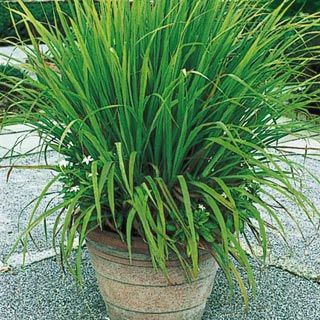
Images Gurneys.com
- Catnip: Cats love it, insects hate it. In a 2001 study, researchers found that catnip is 10 times more effective than DEET, the ingredient commonly found in bug repellents. In a study from 2010, the Journal of Agricultural and Food Chemistry found that when applied in areas where flies and similar insects were heavily present, a wax made from catnip oil was able to repel around 99% of observed flies for around three hours. Catnip leaves and stems can be crushed up to create an oily substance that can be applied to the skin to keep some mosquitoes away. If you don’t want to create oil you can occasionally “agitate” the bush in order to release some of their oils into the air.
- Cedarwood: Has been used for chests and insect-proof construction for generations. Cedarwood essential oil is a very aromatic oil that helps repel fleas, ticks, lice, spiders, mosquitoes, and gnats to name a few. A spray can be created by combining ½ pint of cedar oil and 5 gallons of water together. This spray can be used in the garden to drive away insects. However, there has actually never been any recommendations by any major regulating or certification authority.
- Basil: Is part of the mint family and has a subtle peppery flavor and most varieties have glossy green leaves. A staple in Italian cuisine, basil is also know for it’s insect repelling properties. GardeningKnowHow.com states, Plant basil in containers or among the garden or border of your picnic area and flies as well as mosquitoes will stay away. You can crush a few leaves and rub them on your skin and clothing.

Image Food.com
Fun Fact: It is a popular old wives tale that a penny in a bag of water will repel mosquitoes and flies. This is not true. In fact, research has shown that shiny pennies might actually attract insects rather than repel them.
- Neem: Is a tropical tree in the mahogany family. According to Gardeningknowhow.com Neem oil insecticide works as a systemic in many plants when applied as a soil drench. … The compound causes insects to reduce or cease feeding, can prevent larvae from maturing, reduces or interrupts mating behavior and, in some cases, the oil coats the breathing holes of insects and kills them. It also interferes with an insects hormones, making it harder for them to grow and lay eggs. Apparently neem does almost anything. WebMD.com lists it is used for leprosy, eye disorders, bloody nose, intestinal worms, stomach upset, loss of appetite, skin ulcers, diseases of the heart and blood vessels (cardiovascular disease), fever, diabetes, gum disease (gingivitis), and liver problems. The leaf is also used for birth control and to cause abortions.
Visit Amazon to see Neem Insect Repellents and check pricing. Whether you choose an oil for your body or a treatment for your garden you will find a great variety to choose from.
- Sage and Rosemary: Plant these around your patio so you have them handy when the bugs arrive. Both of these everyday garden herbs are burned to keep flying insects away. You can bundle the herbs and throw them on the fire or a better idea is to wet them, wrap them in tin foil and then poke holes in the foil. Throw the tin foil packet on the fire and the herbs will smoke for hours. You can also rub the crushed leaves on your skin or make a repellent from essential oils.
- Lemon Thyme: It is a widely held belief that thyme is a good mosquito repellent. However, their have been no real scientific or laboratory studies to back it up. If you plant lemon thyme you will have a pretty, lemony, evergreen shrub, with lavender flowers, that you should keep away from where you dine. Bees of all kinds, especially the Honeybee, absolutely love it and the minimal mosquito repelling properties will be more than mitigated by the bee problem you may encounter.
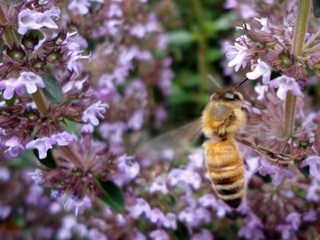
Image Gardenmentors.com
- Tea tree oil: An Australian tree, the Tea tree is most commonly used to treat acne, athlete’s foot, lice, nail fungus and insect bites. It is often listed as a natural insect repellent but there is very little evidence to suggest that it works to repel. More evidence points to it helping after you’ve been bitten.
- Cinnamon oil: Cinnamon oil has a very strong odor that is relaxing for humans but overwhelms the olfactory sensory system of a mosquito causing them to stay away. An article in Entomology Today sites a study which shows cinnamon oil could reduce mosquito attraction for 90 minutes. Cinnamon oil can also be used as an antibacterial and an antifungal.
Fun Fact: Another old wives tale states, a bee entering your house means a visitor is on his way, if you kill the bee, the visitor won’t be a pleasant one.
- Marigolds: There is no scientific evidence that shows Marigolds repel any flying insects. EHow.com notes, When added to an insecticidal soap spray, French marigolds discourage insects that feast on vegetable leaves. But don’t let this discourage you from growing marigolds. Because they are so easy to grow, they are the perfect flower to teach young children about gardening

Image Farmersalmanac.com
Note: Trimmed trees and shrubs improve a property’s air circulation, says Steve Farrelly, owner of New York-based Emerald Tree & Shrub Care Company. The increased air flow “will physically push mosquitoes out of that area and remove the environment they thrive in,” he explains in Countryliving.com
Here is one last easy to follow recipe from Skyaboveus.com on how to make a super strong insect repellent.
Ingredients:
- 1 large clean glass jar with lid
- 32 oz apple cider vinegar
- 2-3 tbsp of dried lavender, mint, rosemary, thyme and sage (12-15 tbsp total)
Method:
- Pour the apple cider vinegar into the glass jar.
- Add the dried herbs and give a good stir.
- Screw on lid tightly and leave in the kitchen where you will see it.
- Leave for 3 weeks, shaking the mixture daily to get the herbs infusing with the vinegar.
- After 3 weeks, strain out the herbs. You will need another jar or a mixing bowl will work fine.
- Pour your infused repellent into the glass jar and pop into the fridge until you need it.
- To use the repellent take a clean spray bottle (easily purchased in drug stores, pharmacies and dollar stores) and have half water half vinegar. Give a good shake and your set! Keep the main jar in the fridge until you need to make it up.
- Every time you need to replenish, add half vinegar with half water.
In Part 2 of Tips to Keep Away Flying Insects When Eating Outside, I’ll provide information on Zappers, Traps, Chemical Repellents, Netting, Clothing, Personal Repellers, Fans and Mosquito Dunks. Be on the look out.
Before you go, I’d like to point out a website that was so informative. Mosquito Reviews had so much great info on mosquitoes that when researching this post, I found myself checking their website whenever I found a piece of info I wasn’t sure about. If they confirmed it, I went with it. If they disagreed, I dove a bit deeper. If you have any mosquito questions or just want to learn more about them, you should definitely check out their site.
